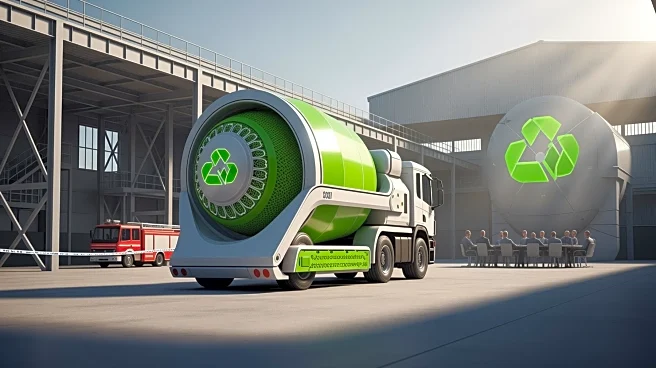What's Happening?
Heidelberg Materials is pioneering the development of low-carbon concrete through the implementation of carbon capture and storage (CCS) technology. The company has launched evoZero, a near-zero emissions
cement, which has achieved the highest Global Cement and Concrete Association (GCCA) low-carbon rating of AA. This innovation is part of Heidelberg's broader strategy to reduce the carbon footprint of concrete production, a process traditionally associated with high CO2 emissions due to the use of Portland cement. The company has successfully built a carbon capture facility at its Brevik site in Norway, capturing around 50% of the plant's CO2 emissions. Plans are underway to establish a similar facility at the Padeswood cement works in North Wales by 2029, aiming to capture up to 95% of emissions. Heidelberg Materials is also promoting the use of supplementary cementitious materials (SCMs) like ground granulated blastfurnace slag (GGBS) and calcined clay to further reduce carbon emissions in concrete production.
Why It's Important?
The development of low-carbon concrete is crucial for the construction industry, which is a significant contributor to global CO2 emissions. Heidelberg Materials' advancements in CCS technology and SCMs offer a pathway to significantly reduce the environmental impact of building materials. This innovation not only supports global efforts to combat climate change but also sets new standards for sustainable construction practices. The availability of evoZero and other low-carbon products provides construction companies with the tools to meet increasingly stringent environmental regulations and consumer demand for sustainable building solutions. As the industry moves towards net-zero targets, Heidelberg's initiatives could play a pivotal role in transforming construction practices worldwide.
What's Next?
Heidelberg Materials plans to expand its carbon capture projects globally, with the next facility set to open in the UK by 2029. The company is also focusing on educating industry professionals through CPD events at its evoHub venue in London, covering topics such as material decarbonisation and the circular economy. As these technologies become more widely available, the construction industry is expected to adopt low-carbon concrete solutions more broadly, potentially leading to significant reductions in global CO2 emissions from construction activities. Stakeholders, including government bodies and environmental groups, are likely to monitor these developments closely, as they align with broader climate action goals.
Beyond the Headlines
The shift towards low-carbon concrete has broader implications for the construction industry, including potential changes in supply chain dynamics and material costs. As demand for sustainable materials grows, companies may need to invest in new technologies and processes, potentially leading to increased costs in the short term. However, the long-term benefits of reduced emissions and compliance with environmental standards could outweigh these initial investments. Additionally, the adoption of CCS technology may influence regulatory frameworks, encouraging more stringent emissions targets and fostering innovation in other sectors.










